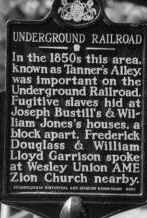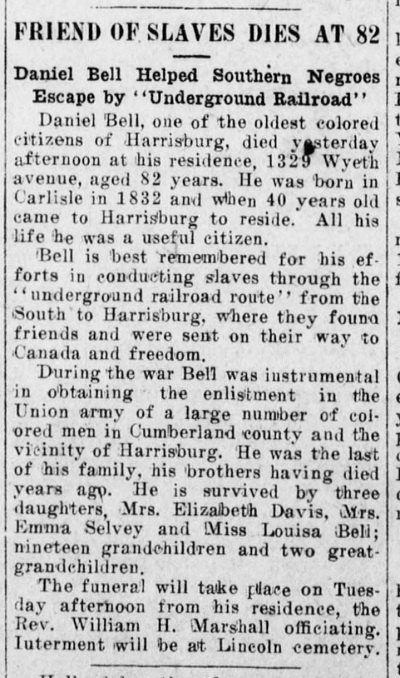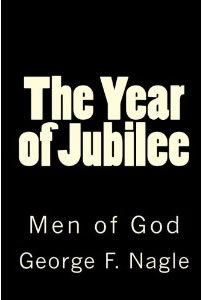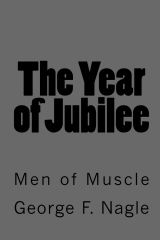
Study
Areas
Daniel W. Bell, Underground Railroad Conductor
People from many different communities and backgrounds were involved with helping freedom seekers escape enslavement. Some worked from within the slave states, providing food, shelter and directions to those trying to get to the free soil of Pennsylvania, and others living in the southern border counties of the Keystone State stood ready to take in fugitive slaves and send them to safer destinations. Black and white citizens both engaged in these secretive and risky operations, sometimes alone and sometimes as part of an inconsistently organized and nebulous network of connections known as the "Underground Railroad."
Well after the end of the Civil War, many of the white operatives told their stories and let it be known that they had sheltered or aided freedom seekers in one manner or another. These stories acknowledged the participation of Black operatives, often referred to as conductors, or those who physically guided or transported fugitive slaves from one station to the next. However few stories from white Underground Railroad station owners actually identified these African American conductors by name.
It is possible the identity of those African American men and women who risked fines, imprisonment and even, for some, those who were themselves formerly enslaved, re-enslavement, were omitted because the white station agents did not know their names. Perhaps they thought that African American operatives would in turn tell their own stories. Regardless of the reason, far more is known about white Underground Railroad operatives than is known about African American operatives, even though at least as many if not more African Americans were involved. Fortunately, research is turning up more and more information on Black Underground Railroad agents and operatives.

Text of news article in the Star Independent:
FRIEND OF SLAVES DIES AT 82
Daniel Bell Helped Southern Negroes Escape by "Underground Railroad"
Daniel Bell, one of the oldest colored citizens of Harrisburg, died yesterday afternoon at his residence, 1329 Wyeth avenue, aged 82 years. He was born in Carlisle in 1832 and when 40 years old came to Harrisburg to reside. All his life he was a useful citizen.
Bell is best remembered for his efforts in conducting slaves through the "underground railroad route" from the South to Harrisburg, where they found friends and were sent on their way to Canada and freedom.
During the war Bell was instrumental in obtaining the enlistment in the Union army of a large number of colored men in Cumberland county and the vicinity of Harrisburg. He was the last of his family, his brothers having died years ago. He is survived by three daughters, Mrs. Elizabeth Davis, Mrs. Emma Selvey and Miss Louisa Bell; nineteen grandchildren and two great-grandchildren.
The funeral will take place on Tuesday afternoon from his residence, the Rev. William H. Marshall officiating. Interment will be at Lincoln cemetery.
Text of news article in the Telegraph:
President of "Undergroun'" in the Sixties Dies at 82 The death certificate for Daniel Bell, signed by his daughter Louise, records his date of birth as February 1832. The day of the month is left blank and marked "No rec." (no record?). Place of birth is recorded as Baltimore, Maryland. The date of burial in Lincoln Cemetery is recorded as 15 December 1914.
Daniel Bell is found in the 1860 census of Carlisle, Pennsylvania, East Ward, living with Frances Bell. They are enumerated as follows: Daniel Bell, born in Maryland, age 29 (born c1831), a laborer; Frances Bell, born in Pennsylvania, age 31 (bc1829), cannot write. Both are recorded as "Black." No children are listed with the household.
The Bell family is found in the 1870 Census of Carlisle, Pennsylvania, East Ward as follows: Daniel Bell, born in Maryland, 48 years old (born c1822), a laborer; Wife Elizabeth, born in Pennsylvania, 44 years old (born c1826), cannot read or write; Children Luther, age 11 (bc1859), William, age 9 (bc1861), Elizabeth, age 6 (bc1864), Martha, age 4 (bc1866) and Daniel, age 3 months (b February 1870). The household also includes housekeeper Sallie Bobb, age 22, born in Pennsylvania c1848, cannot write. Sons Luther and William were recorded as attending school that year. The race of everyone in the Bell household, including housekeeper Bobb, was recorded as "Black."
By the time of the 1880 census, the family has moved to Harrisburg and is enumerated at 1328 Margaretta Street, living with another African American family, the Charles Smith family. Daniel reports Maryland as the state of birth for him and both of his parents. His wife Sarah, born in Pennsylvania, reports that both of her parents were born in Maryland as well. Children in 1880 are Emma, age 8, Louisa, age 4, and Annie, age 1, all Pennsylvania born. By 1900, the family is living at 1329 Wyeth Street in Harrisburg, where they are found in 1910, in the last census before the deaths of Daniel and Sarah. They report being married for 48 years (c1861/2), and Sarah reports having given birth to 11 children, three of whom were still alive. Presumably those are the three daughters named in their obituaries.
Daniel Bell, Who Helped Scores of Slaves to Freedom, Dies at Home in Wyeth Avenue
In a little old house in Wyeth avenue just above Verbeke street yesterday afternoon, Daniel Bell, colored, "president" before and during the Civil War of the "Underground Railway" of Central Pennsylvania, started toward the land where race an color are unknown. Death found the aged colored man cheerful and happy. He was 82.
Daniel Bell was born February 14, 1832, in Carlisle, Cumberland county, where he lived until he was 39. Since then he has always lived in Harrisburg.
During the War of the Rebellion he was a recruiting officer for the government. But he was best known for the work he did in helping scores of escaped slaves from the Virginias to get into Canada. He was a head of the "Undergroun'" in this section of the State and was known to thousands of negroes throughout the neighboring slave States.
Mr. Bell was the last one of the family of Bells. His wife was born in Franklin county. She died about two and a half years ago. He is survived by three daughters, Mrs. Elizabeth Davis, Mrs. Emma Selvey, Miss Louisa Bell; nineteen grandchildren, and two great-grandchildren.
Funeral services will be held from his home on Tuesday afternoon at 3:30 o'clock. The Rev. William H. Marshall will officiate. Burial will be made in the Lincoln Cemetery.
Notes
Sources
Now Available on this site
The Year of Jubilee
Vol. 1: Men of God and Vol. 2: Men of Muscle
by George F. Nagle
Both volumes of the Afrolumens book are now available on this website. Click the link to read.
The Year of Jubilee is the story of Harrisburg'g free African American community, from the era of colonialism and slavery to hard-won freedom.
 Volume
One, Men of God, covers the turbulent beginnings of this community,
from Hercules and the first slaves, the growth of slavery in central
Pennsylvania, the Harrisburg area slave plantations, early runaway
slaves, to the birth of a free black community. Men of God is a detailed
history of Harrisburg's first black entrepreneurs, the early black
churches, the first black neighborhoods, and the maturing of the social
institutions that supported this vibrant community.
Volume
One, Men of God, covers the turbulent beginnings of this community,
from Hercules and the first slaves, the growth of slavery in central
Pennsylvania, the Harrisburg area slave plantations, early runaway
slaves, to the birth of a free black community. Men of God is a detailed
history of Harrisburg's first black entrepreneurs, the early black
churches, the first black neighborhoods, and the maturing of the social
institutions that supported this vibrant community.
It includes an extensive examination of state and federal laws governing slave ownership and the recovery of runaway slaves, the growth of the colonization movement, anti-colonization efforts, anti-slavery, abolitionism and radical abolitionism. It concludes with the complex relationship between Harrisburg's black and white abolitionists, and details the efforts and activities of each group as they worked separately at first, then learned to cooperate in fighting against slavery. Read it here.
Non-fiction, history. 607 pages, softcover.
 Volume
Two, Men of Muscle takes the story from 1850 and the Fugitive Slave
Law of 1850, through the explosive 1850s to the coming of Civil War
to central Pennsylvania. In this volume, Harrisburg's African American
community weathers kidnappings, raids, riots, plots, murders, intimidation,
and the coming of war. Caught between hostile Union soldiers and deadly
Confederate soldiers, they ultimately had to choose between fleeing
or fighting. This is the story of that choice.
Volume
Two, Men of Muscle takes the story from 1850 and the Fugitive Slave
Law of 1850, through the explosive 1850s to the coming of Civil War
to central Pennsylvania. In this volume, Harrisburg's African American
community weathers kidnappings, raids, riots, plots, murders, intimidation,
and the coming of war. Caught between hostile Union soldiers and deadly
Confederate soldiers, they ultimately had to choose between fleeing
or fighting. This is the story of that choice.
Non-fiction, history. 630 pages, softcover.

